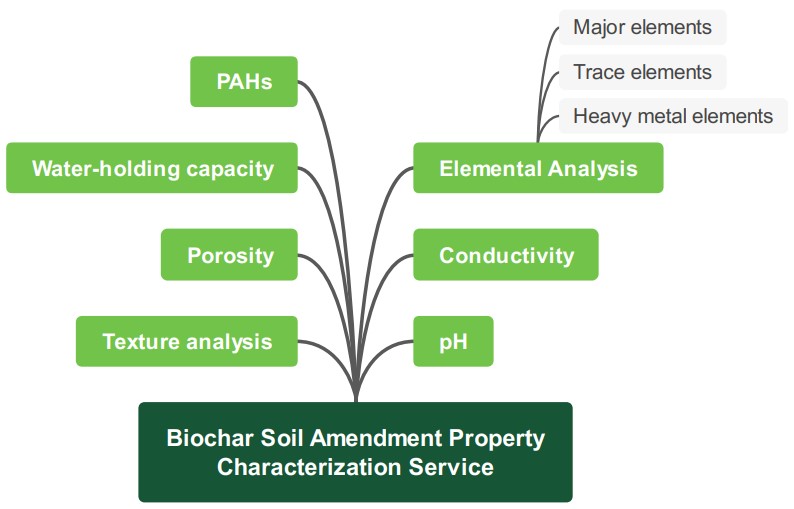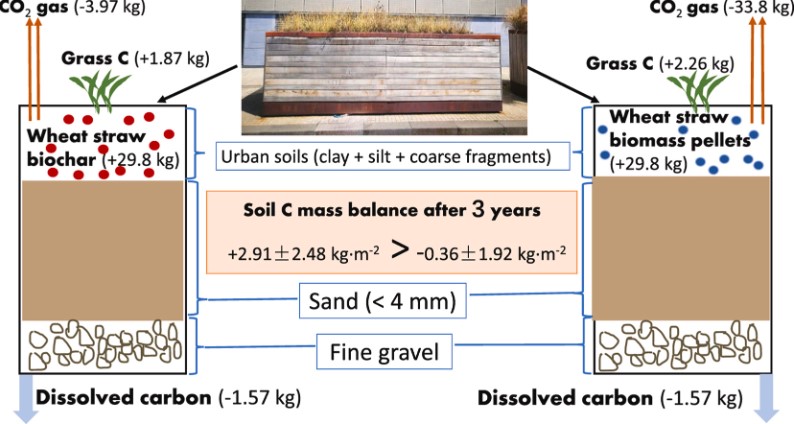Biochar Soil Amendment Property Characterization Service
Comprehensive Analysis of Biochar Soil Amendment Property at Creative Biolabs
Biochar is a carbonaceous material formed by the pyrolysis of biomass under hypoxic or anoxic conditions. It is widely applied for soil improvement. It improves the physical, chemical, and biological properties of soil, thereby improving soil fertility, water retention capacity, and biological activity. Creative Biolabs is equipped with advanced analytical equipment and instruments. We pay attention to the latest developments in the industry, continuously optimize analytical techniques, improve analytical efficiency, and are committed to providing clients with professional biochar soil amendment property analysis and characterization services.
We evaluate the effect of biochar on soil texture by measuring the particle size composition and structural characteristics of the soil, as well as parameters such as apparent density.
The pH value of the soil directly affects the ability of plant roots to absorb nutrients. We use a pH meter to measure the soil pH after biochar addition and evaluate the regulating effect of biochar on soil pH.
We measure the soil porosity to understand the effect of biochar on soil aeration and water retention and evaluate the drainage performance of the soil.
Analyzing the conductivity of biochar is an important method to evaluate its ion conductivity and electrolyte content in the soil. We prepare a homogeneous solution by mixing the appropriate amount of biochar sample with the appropriate amount of water. Then we measure the conductivity values of these solutions by a conductivity meter. By analyzing the conductivity of biochar, we evaluate its electrolyte properties in soil and help understand its interactions and effects in the soil environment.
Biochar is a carbon-loaded soil conditioner, and analyzing its water-holding capacity helps evaluate its potential to regulate water in soil. We prepare biochar samples with different moisture contents, then place them at 100% relative humidity or other predetermined humidity conditions, and measure the weight or humidity of the samples regularly to record the changes during moisture absorption. Subsequently, we expose the biochar samples that have absorbed moisture to a drier environment and measure the weight or humidity of the samples regularly to record the changes during water release. By monitoring the weight or humidity changes of the biochar samples during moisture absorption and water release, we calculate the water-holding capacity of the biochar and express it as moisture absorption rate or related parameters.
-
Elemental Analysis
We use gas chromatography, spectrophotometer, or atomic fluorescence spectrometer to determine the content of major elements such as nitrogen, phosphorus, and potassium. These elements are essential nutrients for plant growth, and analyzing these elements helps determine whether biochar can increase soil fertility.
The content of trace elements (such as iron, manganese, cadmium, chromium, etc.) is usually determined by inductively coupled plasma mass spectrometry (ICP-MS), atomic absorption spectroscopy (AAS), and other technologies. Trace elements play a key role in plant growth and soil ecosystems. Analyzing the content of trace elements helps to evaluate the impact of biochar on trace elements in soil, and further guides soil management and plant growth.
Heavy metals are harmful substances in the soil that endanger soil ecosystems and human health. We use AAS, and ICP-MS to determine the content of heavy metal elements such as lead, mercury, and cadmium. By analyzing the heavy metal content, we evaluate the adsorption capacity of biochar on heavy metals in the soil and its potential impact on the soil environment.
-
Polycyclic aromatic hydrocarbons (PAHs)
PAHs are a class of organic pollutants that may pose potential risks to soil and the environment. By analyzing the PAH content in biochar, we evaluate the impact of biochar on plant growth and provide data support for the sustainable use of biochar. We first treat the biochar sample appropriately, extract PAHs using a suitable solvent, and then obtain the sample through purification and concentration steps. Subsequently, gas chromatography-mass spectrometry is used for analysis to identify and quantify the PAH content.

Creative Biolabs has a strong Biochar Production and Analysis platform. In addition to the above services, we also provide Biochar Manufacturing, Physical Property, and Thermal Property analysis services. If you would like to obtain specific details, please do not hesitate to contact us immediately and we will respond to your needs quickly.
Published data
In recent years, climate change has become an increasingly serious problem, and many countries have introduced policies to regulate carbon emissions in response to climate change caused by human activities. To achieve carbon neutrality, effective methods must be taken to offset carbon emissions, such as sequestering carbon in the soil or increasing vegetation biomass. In this regard, using biochar as a soil amendment for carbon sequestration is an effective way to reduce emissions. Biochar can not only repair contaminated soil but also improve soil properties, thereby promoting plant growth and reducing the risk of water pollution. In this study, the authors used two percolators to study the effects of wheat straw and its biochar on urban soil carbon sequestration over three years under real outdoor conditions. They compared a series of parameters such as carbon isotope ratios, CO2-C emissions, soil water content, and carbon fixed by aboveground vegetation in the two percolators during the experiment. The results showed that compared with the soil amended with wheat straw, the content of organic carbon and inorganic carbon in the soil with the addition of biochar was significantly increased, and the carbon in the biochar had higher stability.
 Fig.1 Effect of wheat straw and its biochar on soil carbon sequestration.1, 2
Fig.1 Effect of wheat straw and its biochar on soil carbon sequestration.1, 2
FAQs
Q1: How does the amount and frequency of biochar application affect the soil?
A1: Our analysis will evaluate the optimal amount and frequency of biochar application to maximize its soil improvement effect and reduce environmental risks.
Q2: What effect does biochar have on soil microbial communities?
A2: We analyze the soil improvement properties of biochar to evaluate its impact on soil microbial activity and community structure to help clients better understand the overall effect.
Q3: How can your analysis services help clients choose the right biochar product?
A3: Our analysis will provide a comparison of the performance of different biochar products in soil improvement to help clients choose the product that best suits their needs.
Customer Review
Professional Soil Performance Analysis Reveals The Advantages of Biochar Products
"Creative Biolabs' biochar soil improvement property analysis service was detailed and professional, giving us a better understanding of the product's performance in terms of soil fertility, water retention, etc. I highly recommend their service!"
Accurate Soil Improvement Analysis Report
"Creative Biolabs's analysis report was accurate and detailed, helping us select the most suitable biochar product and optimize the soil improvement plan. I rate their analytical services highly positively."
References
-
Wang, Jiaqian, et al. "Biochar benefits carbon off-setting in blue-green infrastructure soils-A lysimeter study." Journal of Environmental Management 325 (2023): 116639.
-
Under Open Access license CC BY 4.0, without modification.
For Research Use Only.
Related Services


 Fig.1 Effect of wheat straw and its biochar on soil carbon sequestration.1, 2
Fig.1 Effect of wheat straw and its biochar on soil carbon sequestration.1, 2

